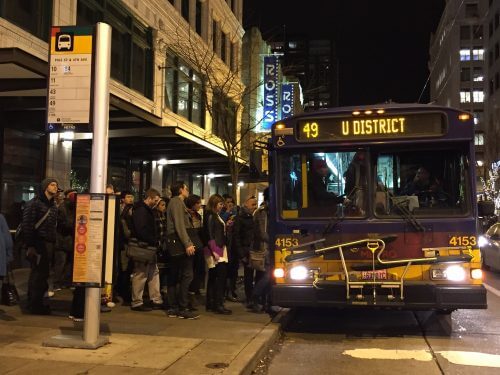The Israeli start-up company HopOn has developed a system that automatically identifies passengers boarding the bus, and charges them via an app, all in a fraction of a second.

HopOn was one of the eight Israeli companies that reached the finals of the Visa's Everywhere innovation competition that was recently held in Copenhagen, in which nearly 200 European companies competed. HopOn competed in the smart transportation solutions category. The companies were required to show how they would use the Visa API interfaces in the solutions they offer in three categories, and the winning teams would even get to use them.
Public transport users know the waste of time created when a driver has to deal with cash or even validating the multi-line card. Ofer Sinai, founding partner of HopOn explained: "The idea started in 2013 when we realized that a lot of time was wasted on the ticketing systems, validating the multi-line card, or sometimes paying in cash. According to our analysis, about 2-3 minutes are wasted at each station in Tel Aviv during rush hour, which may increase the travel time by about half an hour.
We have developed a payment system based on beacons (Beacon), a technology that allows the passenger to pay for the trip using the smartphone that is in the passenger's pocket. The system allows many passengers to board the bus at the same time. Since 2015 we have been operating a commercial service in Israel together with the Dan company. Dan's system allows you to recharge your phone with a pre-paid charge for one or several trips (for example, monthly free). We are soon going to launch a Post Paid payment option: the passenger will get on the bus freely and his credit account will be charged according to the trips he actually made."

"From 2016 we expanded abroad with clients in Germany, the Czech Republic and Spain. Among our investors are many banks such as Bank Hapoalim, Standard Bank from South Africa and more."
"The connection to Visa is clear: this is from the very fact that we cooperate with the banks that are customers of Visa as issuers or liquidators. If we can get the stamp from Visa we can increase our ability to cooperate with banks."
Oded Salomi, CEO of Visa in Israel, said: HopOn was among 8 Israeli companies that advanced to the final stage and competed for the prizes against 7 other young companies from around Europe. The competition was tough, but the contestants stood out with their innovative ideas, advanced technologies and solutions, which will change the way people buy and use money."
Bill Gajda, senior vice president of innovation and strategic partners in Europe, the Middle East and Africa at Visa, said: "We have been looking, and we continue to look, for a wide range of fintech solutions. In places like Tel Aviv, Berlin and London there are a lot of companies that work in these fields."
"Israel is strong in many technologies, not only in everything traditionally related to security. Israel is starting to become a world leader in the field of biometrics and now a vibrant Bitcoin community is also emerging there. In general, there are many good fintech companies in Israel that we want to work with and accelerate their development."

3 תגובות
א
Sydney, Australia has a similar system. You buy a smart card once and hold it for a bus, train, light rail, or ferry and you pass it near a small machine. It takes very little time. You pass it again on the descent at the destination.
You don't have to decide in advance what your destination is. The driver does not bother with money and explanations.
There are cameras in every vehicle and the system beeps when it recognizes a ticket.
There is an amazing discount system. There is a daily ceiling and a weekly ceiling. That is - if you have a lot of trips in one day, in a fairly quick phase you travel for free. If you have a long commute to work, then again, after a day or two it's free.
There is an application on the phone that also knows how to load the card (you just attach it to the phone and insert an amount of money). In addition - it is connected to Google Maps. If you want to get to some point - you enter an address and get exactly how to get there, including a schedule. While traveling, the app will inform you when you arrived at the station, and so on.
My father - and all this was done by a company that has a monopoly...
Today, too, people go up with the rabko in the back.
There is a critic who comes up sometimes and entertains and has the authority to give a fine to those who swear.
I don't understand how it works
Does every passenger pass the phone near a device? If so, how is it different or faster than transferring a card?
And if it is enough to walk through the door with the phone even in the pocket, how does the driver and the system detect if someone turned off the device, for example, in order not to pay. If a group of people enter together, how do you identify who didn't pay?